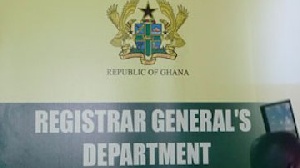The Registrar General's Department, with the World Intellectual Property Organisation (WIPO), has organised a workshop to educate lawyers and institutions on the Madrid System for the International Registration of marks.
This would help promote the system amongst users and simplify the way businesses use and manage their trademarks worldwide.
The WIPO Madrid system is a filing system that offers people the ease of registering their trademarks in as many territories as they desire.
The Acting Registrar General, Mrs Jemima Oware, told the participants that in a globalised world, one did not need to have physical structures dotted in countries across the world in order to have market presence.
She said it was, therefore, essential for institutions who registered their businesses with the Registrar General to know how to use, guard and enforce the rights they had in Intellectual Property (IP) to the business they owned.
Mrs Oware said the Madrid System allowed people to access and patronise products online and also trade in commodities.
She noted that the system made it possible for businesses to market their products just by searching the names, brands or trademarks on the internet.
“This allows interested people to see your identifiers and patronise the products or services you provide,” she advised.
She said trademarks were well protected within the territories they operated, therefore, “Businesses today are able to use their marks as collaterals for loans and also consider their marks as valuable assets, hence the need to protect one’s mark in many territories as necessary.”
Statistics, she said, had shown that globally applications for the registration of marks through the Madrid system had increased consistently and more countries continued to accede to the Madrid Protocol, for which Ghana was a contracting party.
“The Madrid System provides brand owners with potential faster and cheaper access to international brand protection,” she said.
Mrs Oware stressed that the system offered opportunity not only for businesses to apply for the registration of their marks in many territories with ease, but also saved the IP offices of the members of the Madrid Union the time they would have used to conduct formal examination of applications.
“It also offers new lines of business for local agents and the opportunity to act on behalf of foreign clients who file their applications through the system,” she explained.
She, therefore, urged all to find the system useful, recognise and take advantage of the opportunities it offered to them as persons, agents and individuals for the socio-economic growth.
Business News of Friday, 4 March 2016
Source: GNA







![NPP Flagbearer, Dr. Mahamudu Bawumia [L] and NDC Flagbearer John Mahama NPP Flagbearer, Dr. Mahamudu Bawumia [L] and NDC Flagbearer John Mahama](https://cdn.ghanaweb.com/imagelib/pics/869/86902869.295.jpg)









